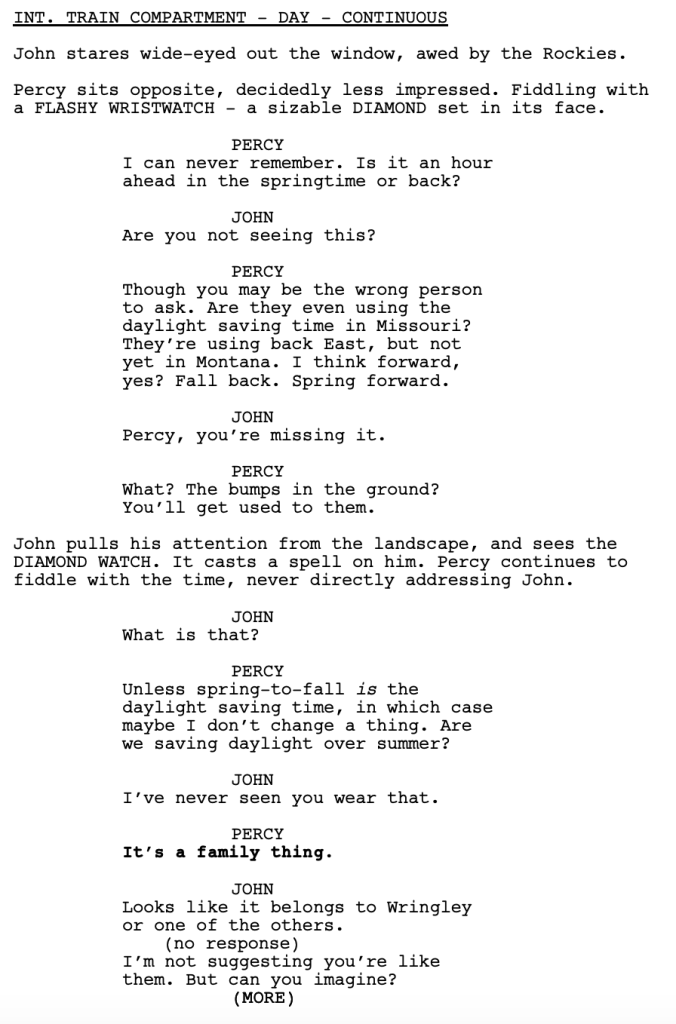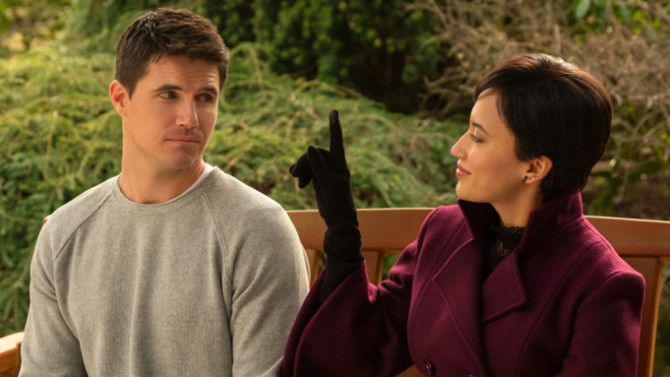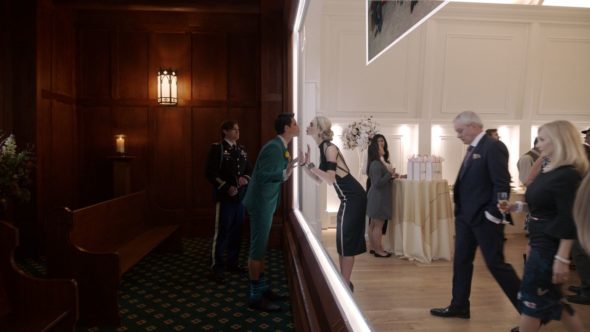Genre: Romantic Comedy
Premise: After Georgia accidentally receives an out of the blue invitation to her on-again, off-again boyfriend’s wedding, she and her best friend Keely make the ill-informed decision to attend.
About: This script finished with 8 votes on last year’s Black List. It’s Carrie Solomon’s breakthrough screenplay.
Writer: Carrie Solomon
Details: 117 pages
The nice thing about reading screenplays is that you can cater the day’s read to whatever mood you’re in. Today, I needed a pick-me-up so I decided to read a comedy. Now if there’s one thing I’ve learned about comedies, it’s that if you don’t laugh on the first page, there’s a good chance you won’t be laughing at all.
I started with a script called “Dude Ranch,” which had a premise I didn’t understand. When his ex-wife starts dating another guy, our hero follows him to something called the “Dude Ranch” where you compete in manly activities, except they’re the woke version of manly activities. On top of this, the first ten pages were all about religion. So I had no idea what was going on. And I didn’t laugh once in ten pages.
I then moved to a Black List script called, “Assisted Living.” Here’s the logline on that one: “When a thief on the run needs to go into hiding, disguised as an 81 year old, she checks into a retirement community shared by her estranged grandmother.” Not the worst idea. And the first page did make me laugh. A young girl is helping her mom steal something by distracting the store owners, pretending to be a lost French girl looking for her parents. She doesn’t actually know French. She’s just throwing out a bunch of random French words together. It’s working until a guard walks over who speaks fluent French.
So I said, okay, we might have something there. But we follow that up with that same girl, now 35 years old, going to a club, noticing a bunch of bitchy 20-something girls making fun of her age, so she goes out on the dance floor and twerks like a maniac to prove she’s still got it. All I could think was, “What does this have to do with the premise?” Talk about random. So I x’d out of that after 15 pages.
That led me to this script, My Boyfriend’s Wedding. The first scene, which had our heroines out clubbing, begging for the defiant DJ to play “Alone” by Heart didn’t make me laugh. But it did make me smile. And I liked the banter between the friends and the DJ. I was getting tired of opening new scripts so I said, screw it, I’m in.
30 year old Georgia is a commitment-phobe. She has this great guy named Adam she’s known since high school who routinely flies out to visit her from Atlanta, and every time they’re together he asks her to become his committed girlfriend. But every time, Georgia resists.
So one day Georgia and her best friend Keely are hanging out and they receive an invitation from Adam’s parents… TO HIS WEDDING! What??? Georgia is confused. This man has spent the last three years proclaiming his love for her. They just had sex a few weeks ago. He’s getting married?? What’s going on???
Determined to straighten this out, Georgia accepts the invitation and makes Keely her plus-one. They fly to Atlanta where Georgia makes a bee-line to Adam at the pre-wedding party. Adam apologizes. He admits he’s been dating his fiance, Missy, for a couple of years. He’s only ever wanted to be with Georgia but since she wouldn’t commit, he decided to finally tie the knot.
Meanwhile, Keely bumps into Missy and the two start a friendship that quickly becomes sexual. When Georgia and Keely reconvene, Keely doesn’t tell Georgia she’s now sleeping with the bride. Georgia then loses control and sleeps with Adam again. It’s a wedding catastrophe!
Keely is determined to break up the wedding because Missy is such a great person and she shouldn’t be marrying a man who’s secretly in love with another woman. Georgia eventually becomes convinced that Adam is selfish and he wanted to keep two girls on the line and tells him as much.
Georgia and Keely then head home where the movie decides to explore their broken friendship for the third act. I guess the movie was about their friendship all along? Maybe? I don’t know. I had a hard time figuring this one out.
“My Boyfriend’s Wedding” needed to nail down the screenwriting basics better. Character, structure and theme.
For starters, nobody’s sympathetic here. Every time Adam has professed his love for Georgia, she blows him off. So we don’t like her. It turns out Adam has been hiding this whole other girlfriend from Georgia. So we don’t like him. Missy moves in on Keely, so we don’t like her. And Keely is straight up annoying. So we don’t like her.
Who are we rooting for here?
I prefer you have more than one sympathetic character in your script. But at the very least, your hero needs to be sympathetic. Everybody else do whatever you want with them as long as they’re funny. But Georgia has to be sympathetic. And she isn’t. We’re not even sure why she’s mad at Adam. She friend-zones him whenever he tries to make her his girlfriend so why is she getting all angry that he has someone else?
You may have been able to get away with this if Adam was a HUUUUUGE a-hole. Like he was super-manipulative and is banging three other women on the side. Sometimes you don’t need a sympathetic hero if the audience is obsessed with taking the villain down. But Adam and Georgia are high-school sweethearts. So it’s odd. We’re not sure if we’re supposed to hate the guy or like him, root for them to get together or stay apart.
If the audience isn’t sure what they’re supposed to root for, you don’t have a story.
The structure was odd as well. It’s a movie titled My Boyfriend’s Wedding yet the final act takes place after the wedding in another city. Not only that, but the movie becomes about Georgia and Keely becoming friends again after their wedding fallout. That would be okay if you’d established that there was a deep-rooted problem in their friendship through the first two acts. But they were fine in the first two acts. They disagreed on a few things but were otherwise great.
Your third act is the act that needs to resolve all of the things you’ve set up in the first two acts, both in the plot and with the characters. So for you to all of a sudden say, “Oh, this is about friends now,” is jarring.
The characters also had motivation issues. You establish in the first scene that your hero doesn’t like someone. Adam tells Georgia he loves her and she tells him she’s not interested. So why would that person care about breaking up his wedding?
This is what a lot of comedy writers don’t understand. They only focus on the jokes. But if the fundamentals don’t make sense, the jokes won’t land. You have to set everything up so that we go into each scene understanding where each character is coming from. That’s why we laugh. When we see their plans get screwed up and turned around.
Take Bridesmaids, for example. Look at how clearly they set up the main dynamic. Kristin Wiig’s character is jealous that this other woman has become best friends with her best friend. So in every one of their scenes, she’s trying to out do her. Like the toast scene. She will not be topped. She has to keep going and giving a better toast. The motivations in My Boyfriend’s Wedding were never clear and therefore we weren’t sure when we were supposed to laugh.
I guess the argument for this as a script is that it’s a romantic comedy that takes a look at female friendship. We don’t see a lot of those. But if that’s what this movie is going to be, there needs to be a lot more focus placed on the friendship. You can’t throw all that in at the last second. It’s thematically inconsistent.
Unfortunately, I couldn’t get into this one. What did you guys think?
[ ] What the hell did I just read?
[x] wasn’t for me
[ ] worth the read
[ ] impressive
[ ] genius
What I learned: In comedies, you need to define who it is we’re rooting for to win and who it is we’re rooting for to lose. In other genres, you can play around more in the gray. But even then, I advise you give us clear good guys and bad guys. If it’s muddy, like it is here, it leaves the audience unsatisfied. They’re not really sure who won and who lost.
Today’s screenplay isn’t like anything else out there at the moment, setting the stage for another exciting read.
Genre: Thriller/Action
Premise: When the underprivileged John Unger is invited to spend the summer at the mansion of his peculiar classmate, his thirst for grandeur leads him down a dangerous exploration of greed, morality, and the secret horrors of the ruling class. Based on the F. Scott Fitzgerald short story.
About: This script finished with 8 votes on last year’s black list. It was smartly plucked from a 1922 F. Scott Fitzgerald short story collection. Just a reminder to those looking for material. The 95 year public domain statute allows you rights to anything written up until 1923. Cody Behan clearly had his eyes on this one as he wrote it last year, when the statue was up until 1922. Something to keep your eyes on, guys. Fitzgerald’s early works (The Beautiful and the Damned included) are out there for the taking.
Writer: Cody Behan (based on a short story by F. Scott Fitzgerald)
Details: 126 pages
Movie announcements in the last few days have become bizarre. Tom Cruise and Elon Musk are filming an entire movie in space? Unless that movie is titled, “Hanging out with the International Space Station Crew and Eating Food Sludge Packets Together,” I can assure you this will never happen.
I just did a little online sleuthing. It costs $10,000 to put ONE POUND in space. An Arri Alexa camera is 15 pounds. All decked out it’s closer to 30 pounds. That’s 300,000 for your camera. Oh, and let’s not forget the 170 pound camera man. He’ll cost you 1.7 million dollars to put into orbit. That’s not counting the half a million dollars you’ll have to invest in training him to become an astronaut.
And then what’s your plot when you get into space?? A Tom Cruise zero gravity spinny circles contest? You could make the exact same movie with special effects that will cost you 1/10th the price and look 10 times as good.
What does this have to do with today’s script? Actually, a lot. It turns out F. Scott Fitzgerald had some zany high concept ideas of his own back in the day. This is not The Great Gatsby. This is Fitzgerald if he hired Edgar Rice Burroughs to write one of his ideas. It’s weird. It’s kooky. And for a story I’d never heard of before, it’s better than you’d expect!
16 year old John Unger has escaped his lower-class mining town to become one of the rare poor people admitted to Connecticut’s prestigious St. Midas school. When he arrives, he’s immediately given the cold shoulder by all the richy riches. All of them except for one.
The mysterious Percy shows up like a baller at a party, busting out a ONE THOUSAND DOLLAR BILL and then burning it to ash in front of everyone. John becomes enamored with Percy, and the two find themselves hanging out constantly.
When summer rolls around, Percy invites John to stay at his home with him. The two travel across the country to the middle of nowhere, where John is shocked to see the coolest most isolated compound in America. Percy, last name Washington, as in, yes, great great grandson to George Washington, lives in the richest home in the United States.
That’s because the land rests on a diamond that is LITERALLY as big as the Ritz Hotel. And here’s where things get interesting. Back in 1922, nobody had Google Maps. This means that you could, theoretically, hide your land from everyone. But times they are a changing. World War 1 has birthed the war plane. And there are rumors drawing a lot of these pilots out to this area, where they could see the family’s secret. If that were to happen, Percy’s father Braddock is convinced the government will take it from them..
This is why Braddock has purchased two spanking new gigantic anti-aircraft guns. When you have more money than God, anti-aircraft guns are a drop in the bucket. Meanwhile, John meets Percy’s smoking hot sister, Kismine, who is thrilled to have a boy to talk to for once. She and John strike up a quick romance, which plays a number on the family dynamic.
A few weeks into the summer, John stumbles across a deep pit, populated with a dozen ragged pilots. It turns out Braddock has been shooting down every plane he sees then throwing the injured pilots down here, where they will spend the rest of their lives so they don’t tell the world Braddock’s secret.
And then it gets worse for John. Turns out this isn’t the only friend Percy’s brought back to the house. Turns out this isn’t the only guy Kismine has developed a crush on. And what happened to these young men? They weren’t in the pit. That’s when John realizes the terrifying truth. He’ll be murdered. But now that he knows the gameplan, can he be the first to survive?
I was surprised by just how zany this script was. We get all these big idea cameos, like Braddock’s radium stockpile, which he is convinced will be the cure to cancer. Or that his family is related to George Washington. Or that they have giant anti-airplane guns… in the year 1922! It honestly reads like the 1922 version of a Marvel movie. It has that big budget popcorn feel to it. And it’s full of these fun twists and turns.
The only problem with the script is that it combines two things that don’t gel well with screenwriting. The first is that we’re putting our hero at a static location where he waits around for the story to come to him. It still manages to work because the reveals are so fun. But there are definitely times where it feels like we’re waiting around for the next plot point to arrive. Active characters always work better. And John is not active.
The other problem is that the story spans a long period of time. I believe six months in total. If you were to write this movie today, it would take place over a weekend. To Behan’s credit, he uses the same device that allows movies like Fight Club to cover a long span of time – VOICE OVER NARRATION.
John is constantly giving us updates on what’s going on. This allows John to say things like, “Even with the blazer, the first few weeks were brutal.” In a single line, we’ve jumped forward three weeks. And it doesn’t feel forced. With that said, this probably would’ve played better with a tighter time frame.
Remember that the more condensed the timeframe, the more tension you’re going to have in every scene. When you have months and months to cover, it’s like a hall pass to take scenes off. To relax. And you don’t want to relax in a screenplay. Especially in a thriller.
The final thing of note is that boy do you have an advantage when your source material is F. Scott Fitzgerald. The dialogue and description throughout “Diamond” was a cut above what the average reader is used to. Here’s a monologue from Kismine: “You see how they look at me. How they treat me. How they dismiss and condescend my every thought. As a daydream. A fantasy. I’m a daughter of Washingtons. I’m expected to dress in pretty dresses, drape myself in pretty jewels, speak in pretty tones, smile pretty smiles, think pretty thoughts, dream pretty dreams, and bite my pretty little tongue. And a year from now, when they present me at court, I’ll be expected to make a pretty match to preserve the stability of the sterling Washington name. I am a show pony trapped in a pretty stable. So don’t scold me for being “a part of” anything. The only thing I’m guilty of is being the only Washington with a conscience.”
Or take this description of John and Kismine’s first kiss: “The distance between their lips vanishes. And again appears.” That’s a lot better than what I usually read, which is some version of, “They kiss passionately.”
I’m really curious about this script. It first presents itself as some hoity-toity 1920s rich vs. poor moral tale, not unlike Gatsby, but then morphs into good old fashioned fun. I haven’t read anything like it. Ever. What do you guys think?
[ ] What the hell did I just read?
[ ] wasn’t for me
[xx] worth the read
[ ] impressive
[ ] genius
What I learned: Here’s a fun little dialogue trick you can use. It almost always works. Have a conversation where each character is having their own conversation. There is no overlap between the two. Here’s an early scene between John and Percy…
Genre: TV Comedy/Sci-Fi
Premise: In a future where your consciousness is uploaded into a hard drive that substitutes for heaven, a young programmer finds himself a new resident of the afterlife after a car accident.
About: One of the most frustrating results of superheroes taking over cinema is the death of the high-concept. I love a great high-concept idea. Hollywood used to be a high-concept battleground. Whoever came up with the best high concept that week won a million dollars. However, the high concept isn’t dead and gone forever. It’s moved over to television, which is why I decided today to review Amazon’s new show, Upload.
Writer: Greg Daniels
Details: First couple of episodes are 1 hour. Rest of episodes are 30 min.
Greg Daniels has been on a roll lately.
He brought back his beloved TV show, Parks and Rec, for a onetime coronavirus benefit episode. He debuted his new big budget comedy, Upload, on Amazon. And he’s got a highly anticipated comedy with Steve Carrell called “Space Force,” on the horizon.
As streaming continues to dig its claws into the theater business, tearing away market share piece by valuable piece, we’ve seen high concepts, which used to be relegated to spec scripts and summer movies, become a prominent force in the streaming space.
15 years ago, Upload would’ve been a movie. Now, when someone comes up with an idea like this, their first thought is ‘TV.’ And I’m still not sure if that’s a good or a bad thing.
Ideas like this always seemed too big for two hours. But they certainly aren’t big enough for 30 hours. That’s the thing that continues to bother me about television. When someone comes up with an idea, they usually have the first season mapped out. And, from there it becomes, “We’ll figure it out.”
Sometimes they do (Breaking Bad). But usually they don’t.
Complicating matters is that Upload isn’t sure what it wants to be. It presents itself as a comedy. But it occasionally delves into serious subject matter, such as how the moral implications of a known afterlife would work. Some of the questions it presents are thought-provoking, but it can be jarring when it moves so fluidly from “What’s the meaning of life?” to Bud the Talking Dog.
Upload is set 50+ years in the future where mankind has set up digital afterlifes you can be uploaded into. Which afterlife you join is dependent on how much money you have. If you have a ton of money, you go to the richest and snazziest afterlife. If you don’t, well, you get the picture.
Nathan Brown is a coder with a beautiful materialistic girlfriend. One night while heading home, his self-driving smart-car crashes and kills him. It’s unheard of for a smart car to crash so we’re suspicious from the start. Due to his rich girlfriend, Nathan gets uploaded into the top afterlife, which looks a lot like colonial Canada.
Seeing as the afterlife is one giant hard drive, you can still communicate via voice or video with the real world, which allows Nathan to stay in touch with his girlfriend. Meanwhile, Nathan is being shown the ropes by his “angel,” which is what they call your tech support helper in the afterlife. Real name Nora, Nathan’s angel develops a quick crush on her latest client.
Back in the real world, Nora is struggling with the fact that her cancer-ridden father still believes in good old God, which means he’s choosing not to be uploaded when he dies. For him, upload is Real Heaven. Nora keeps trying to convince him to sign up for Upload since, if he doesn’t, she’ll lose him forever.
Almost half of the people who get uploaded to the afterlife don’t “take.” They freak out. It’s all too weird for them and they end up committing digital suicide. Nathan is too weirded out by the place and decides to end it all. But Angel/Nora comes racing after him and pleads with him not to end it in a monologue that’s clearly just as much about her father as it is Nathan. It’s enough to get Nathan to stop, for now. But how much longer can he survive in this Groundhog Day hell? Odds are not long.
What I liked most about Upload is that Daniels did a TON of work constructing the mythology. He’s really thought hard about what this world would look like. For example, the third episode focuses on the first “Download,” where someone from the afterlife will be downloaded back into a clone of themselves (a fun cameo from Creed of “Office” fame), paving the way for the afterlife to be joined back with the real world.
Or then there’s the fact that there’s only ever 5000 people around. When Nathan asks about this, Nora informs him that, actually, there’s hundreds of millions of people around but the place would be too crowded if it showed all of them at once so it separates the reality into a series of planes, each of which limits the amount of people visible.
One of my pet peeves is when a writer comes up with a big idea but doesn’t put any effort into actually exploring that idea. Greg Daniels is on the opposite end of that. If anything, he became too obsessed with what this world would look like. That’s how you get ideas like talking dogs.
I also liked the injection of a murder mystery into the plot. One of the best ways to keep people watching, not just for a second episode, but all the way through the season, is an overarching mystery arc. In this case, Nathan was murdered. He doesn’t even know it at first. Someone else has to suggest it to him. But now we’re on the hunt trying to figure out who did this to him. He’s got this supposedly perfect girlfriend who’s a little too cutthroat at times. Could she be involved?
Despite the incredibly rich mythology, something is missing here.
I’m not sure what it is but I think it’s the lack of familiarity in a lot of the situations.
Comedy works best when you put characters in a situation that people can relate to and then you play around with that situation. For example, one of the staples of The Office was those boring conference room meetings that are always a complete waste of time. Anyone who’s worked in an office environment can relate to the absurdity and stupidity of those situations.
And then there’s “Upload,” where a featured scene is Nathan attending his own funeral via a virtual conference app. It’s a clever idea in theory. But the situation is so unfamiliar to us that it’s hard to find any laughs in it. The scene plays out with Nathan feeling weird about the whole thing and yelling at everyone, which leaves you wondering what the point of the whole thing was.
It’s frustrating on a writing front because this is actually what I tell you guys to do. Find situations we haven’t seen before. That way you can give us something original. And yet sometimes I’m reminded that there’s a reason certain things haven’t been explored before. It’s because they don’t work.
I don’t want to totally discount this show. It has its moments. The things it gets right – like the chemistry between Nathan and Nora – it gets really right. But the premise ends up being so weird and complex that there isn’t enough familiarity for us to relate to what’s going on. It’s almost like Daniels went one generation too far with his concept. If it was set a little closer to today, maybe in the beginning stages of integrating this technology into life, there would be more we could relate to. But because it’s so far ahead, it’s a future we don’t understand enough to laugh at.
[ ] What the hell did I just watch?
[x] wasn’t for me
[ ] worth the stream
[ ] impressive
[ ] genius
What I learned: Comedy tends to run into trouble – not always, but usually – when it either a) goes big-budget or b) attempts to push too much drama into the fold. Upload tackles both of these head on and, unfortunately, loses on both fronts.
I’m going to be hard at work all weekend on the newsletter so there’s no time for a Showdown today. But do not worry. I’ll be doing Second Chance Showdown next weekend. As for what to expect with the newsletter, I can confirm now there won’t be any Star Wars in it. For those of you who get angry whenever I talk about Star Wars, rest assured the newsletter is Star Wars free.
However, as long as we’re on the topic of Star Wars, I found out that Leslye Headland is making a Star Wars show for Disney Plus. Headland wrote the movie, “Bachelorette,” about a bunch of mean women being horrible to the soon-to-be bride. More recently she made time-loop show Russian Doll for Netflix. I suppose some people will like this news. But there is nothing in this woman’s work as far as I can see that would indicate she’s right for Star Wars. Star Wars is not mean. It’s not harsh. It doesn’t have angry people walking around being angry at everyone. To be honest, this choice is baffling. What criteria are they using to greenlight stuff over there? And why does Kathleen Kennedy still have a job?? It’s madness I tell you! MADNESSSS111!!!!
Okay, sorry, I had to get it out of the way. I did that so I wouldn’t have to include it in the newsletter so you’re welcome.
Let’s leave you with some screenwriting theory to ponder. A common mistake I encounter in the screenplays I read is the act of convincing yourself versus convincing them. As writers, when we want something to work, it’s very easy to convince ourselves that it works. But you’re not the person you have to convince. You have to convince the reader. And the reader has a much higher bar than you do.
For example, let’s say you’re writing Parasite (spoilers if you haven’t seen the film). You know that you want an ending where Poor Dad kills Rich Dad. So you need to come up with a reason for why that would happen. The “convince yourself” writer writes a single scene before the climax where Rich Dad yells at Poor Dad because he forgot to gas up the car. In the Convince Yourself writer’s mind, he’s done enough to justify Poor Dad raging out and killing Rich Dad.
The seasoned screenwriter, however, knows that that’s not going to fly. So he goes back into the script and writes five separate scenarios where the Rich Dad becomes increasingly disgusted by the Poor Dad’s smell. We see, in each instance, the Poor Dad getting angrier and angrier about the matter. So when he snaps at the final party, it makes sense to us.
This may seem obvious but I run into this issue at least once in every amateur script I read. It’s clear that the writer only worked hard enough to convince himself and didn’t put in the effort to make it believable on the reader’s end. And the reader’s end is the only end that matters.
HAPPY WEEKEND!
Going back through Tuesday’s and Wednesday’s script reviews, I identified a common theme, which was: HOLY SCHNIKEYS, STRUCTURE MATTERS A LOT!
Without structure, you can lose your grip on a good concept by page 20. I actually like the concept of a smart house attacking someone. I know it’s been done before but no one has come up with the definitive version yet. Which means it’s out there for the taking.
But the lazy structuring killed that script.
And a sex VR unit that gets in between the friendship of two couples is also a good idea. Done well, it could be a modern day Sex, Lies, and Videotape.
But the nonexistent structuring killed that script.
So what went wrong? Let’s dive a little deeper.
With “An Aftermath,” a script about a woman whose controlling dead husband lives on in her smart home’s AI, the writer didn’t move the plot along fast enough. For example, it took until page 80 until the house did something even mildly harmful (locking a guest in a freezer).
With “Blur,” about a group of 20-somethings whose lives become entangled after a Sex VR system enters their lives, there was no structure at all because there was no plot. Characters didn’t have anything to do, which left many scenes hanging in the wind, looking for a reason to exist.
Since structure is synonymous with plotting, we can identify part of the problem by looking at the definition of “plot.”
Here’s Wikipedia definition: In a literary work, film, story or other narrative, the plot is the sequence of events where each affects the next one through the principle of cause-and-effect. The causal events of a plot can be thought of as a series of events linked by the connector “and so”.
Ugh. That definition is an enabler for boringness. It’s basically saying that as long as things keep happening one after another, and that they’re connected in even the vaguest way, you’ve properly “plotted” your film. Which is actually what got this week’s scripts into trouble.
When it comes to movies, you want to think of plot as “a character trying to achieve an objective who then must overcome a series of obstacles along the way.”
Almost every good movie follows this model.
It does get tricky in certain situations and if you’re not versed in plotting, you may think some great movies are ‘structure-less’ because they don’t line up with this definition. But they usually do. The formula is just slightly tweaked.
In Shawshank Redemption, for example, Andy Dufrense spends the entire movie hanging out in a prison trying to live a happy life. Where’s the plot in that? Well, as it turns out, Andy Dufresne had a gigantic goal he was trying to accomplish. To escape. It just wasn’t revealed to us until the end.
Or then you have movies like Infinity War where the villain has the goal and all our superheroes are scrambling. That can be confusing since the traditional heroes aren’t the ones going after the primary objective. But the main thing to remember is that somebody wants something really badly and their quest to get that thing disturbs the environment in a way where they’re constantly encountering obstacles that may stop them.
If nobody’s moving anywhere, you can’t throw anything in front of them. That was Blur’s problem.
If characters *are* moving but you’re not throwing enough things at them, you get a script like An Aftermath.
Another reason writers struggle with plotting is because they don’t understand the three act structure. They understand it theoretically. But they don’t know how to put it into practice. Especially when you start having to meet certain page checkpoints. It can be a lot to manage when all you want to do is get your ideas down on the page.
So here’s a basic 2-rule hack to give your script structure. One, give your main character a goal they’re after. That’s imperative. And two, make something big happen every ten pages.
If you want to know a secret about how The Disciple Program was written, it was written during an interactive contest where the writers had to write ten pages at a time, then submit them for feedback before writing the next ten pages. What that did is it forced the writer to make something cool or exciting happen at the end of every ten pages. It basically ensured that the plot kept moving.
Or if you want to make it even simpler on yourself, HAVE BIG PLOT POINTS HAPPEN A LOT FASTER THAN YOU THINK YOU HAVE TO MAKE THEM HAPPEN. What I’ve found with beginner screenwriters in particular (but this can happen to any screenwriter) is that they believe their script is more interesting than it is. This gives them permission to allow their plot to unfold verrrrrrry slowwwwwwwwly. You need to constantly disrupt your story with new obstacles, new information, and new developments.
95% of screenplays are boring because they don’t follow this simple principle.
That would’ve helped “An Aftermath.” But Blur is a tougher case because it doesn’t fit into that neat structural box.
That’s because you have four protagonists instead of one. The reason this is a challenge is because it prevents you from doing the “Main character has a goal they go after” approach. How do you address this?
You do it by applying the same approach, but split up between four characters. That means each character should have a goal they’re trying to obtain during the story.
For one it might be getting into law school. For another it might be getting a job in the city they always dreamed of living in. For another it might be breaking up with their significant other, something they want to do but haven’t had the courage to do. These goals don’t have to be Avengers-level goals. They just have to be important in relation to the story you’re telling.
Once you give these characters goals, something magical happens. They’re now going to have places to be. They’re now going to have things to do. They’re now going to have more interesting things to talk about. You now have obstacles to throw at them because there’s finally something to throw an obstacle at (Character A gets admitted into law school but then is denied a student loan. They can’t afford school without that loan. What are they going to do?).
You may say, what does this have to do with a VR sex machine story, Carson? This is the beauty of adding purpose to your characters’ lives. You get to tell the exact same story you’re telling – these characters get intertwined with an addictive new sex technology – but it’s now happening inside a life that has more detail, has more interesting developments, has… well… HAS MORE SH#% GOING ON!
But most importantly, these new objectives in your characters’ lives provide the script with STRUCTURE. The reader now has a sense of where your characters want to be so they feel like we’re all on a purposeful journey together.
You need to provide the reader with a series of rewards along the way for them to feel satisfied. “If you read just a little bit longer,” you promise them, “you’ll get to find out if Jane convinced the bank to give her that student loan.” But if you don’t integrate these purposeful journeys for each of your characters, your script won’t have these rewards. And if we, the reader, aren’t being rewarded, we’re getting bored.
So yes. Character is important. Dialogue is important. Theme is important. But if your structure is limp, or worse, non-existent, none of that matters. So make sure your structure is on point.
Carson does feature screenplay consultations, TV Pilot Consultations, and logline consultations. Logline consultations go for $25 a piece or $40 for unlimited tweaking. You get a 1-10 rating, a 200-word evaluation, and a rewrite of the logline. They’re extremely popular so if you haven’t tried one out yet, I encourage you to give it a shot. If you’re interested in any consultation package, e-mail Carsonreeves1@gmail.com with the subject line: CONSULTATION. Don’t start writing a script or sending a script out blind. Let Scriptshadow help you get it in shape first!









